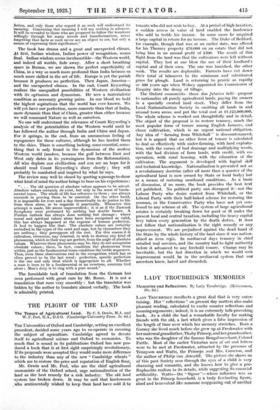THE PLIGHT OF THE LAND
The Tenure of Agricultural Land. By C. S. Orwin, M.A. and W. F. Peel, M.A., D.S.O. (Cambridge University Press. 2s. 6d.) THE Universities of Oxford and Cambridge, setting an excellent precedent, decided some years ago to co-operate in covering the subject of agriculture. Cambridge agreed to devote itself to agricultural science and Oxford to economics. To much that is sound in its publications Oxford has now pro- duced a book that is at first sight surprisingly revolutionary. If its proposals were accepted they would make more difference to the industry than any of the new " Cambridge wheats " which are to restore the price and reputation of English flour.
Mr. Orwin and Mr. Peel, who are the chief agricultural economists of the Oxford school, urge nationalization of the land as the best remedy for a sick industry. The old land system has broken down. It may be said that landowners _who sentimentally wished to keep their land have, sold it to tenants who did not wish to buy. At a period of high taxation, a sudden access in value of land enabled the landowner who sold to treble his income. In some cases he acquired a large capital in return for no income. The Duke of Bedford, for example, though that was at an earlier date, was offered for his Thorney property £70,000 on an estate that did not bring him in an annual profit of £500. The result of this flight from the land was that the cultivators were left without capital. They lost at one blow the use of their landlord's capital and of their own. The one was banished, the other sunk. The results are deplorable. Farmers have cut down their total of labourers to the minimum and substituted grass for plough. Land is returning to prairie as rapidly as 400 years ago when Wolsey appointed his Commission of Enquiry into the decay of tillage.
The Oxford economists—those duo fulmina belli—propose to nationalize all purely agricultural lands, paying the owners in a specially created land stock. They differ from the Land Nationalization Society in omitting all lands in and around town areas, and put the total cost at £1,125,000,000. The whole scheme is worked out thoughtfully and in detail. The object of the proposal is to restore tenancy, much the most popular form of tenure among English farmers, and closer cultivation, which is an urgent national obligation. Any idea of " farming from Whitehall " is discountenanced, but it is argued that no other form of tenure is calculated to deal so effectively with under-farming, with land exploita- tion, with the curses of bad drainage and multiplying weeds, with the bad division of farm lands, with credit, with co- operation, with rural housing, with the education of the cultivator. The argument is developed with logical skill and technical knowledge. Nationalization is presented not as a revolutionary doctrine (after all more than a quarter of the agricultural land is now owned by State or local body) but as a means of restoring moribund conditions. As a basis of discussion, if no more, the book provides the best text yet published. No political party can disregard it—not the Labour Party who desire control from Whitehall, or the Liberal Party with their half-baked scheme for restoring the yeoman, or the Conservative Party who have not yet con- fessed to any scheme at all. The system of large agricultural estates is certainly breaking down for good or ill under the present local and central taxation, including the heavy capital levy taken every generation by the death duties. It does not follow that nationalization is the right remedy or any improvement. We are prejudiced against the dead hand of the State by the whole history of the land since it was nation- alized as terra regis. In mediaeval days tenancy in chief entailed real services, and the country had to fight authority before it advanced to any freehold tenure. Change may be inevitable, but the last direction in which we would seek improvement would be in the mediaeval system that our ancestors knew, hated and discarded.










































 Previous page
Previous page